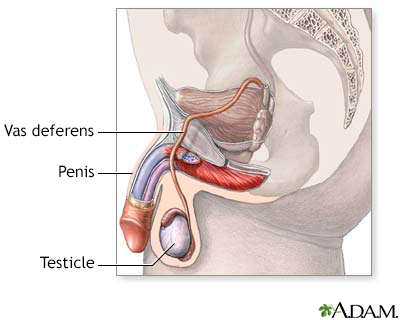Definition
Penile cancer is cancer that starts in the penis, an organ that makes up part of the male reproductive system.
Alternative Names
Cancer - penis; Squamous cell cancer - penis; Glansectomy; Partial penectomy
Causes
Cancer of the penis is rare. Its exact cause is unknown. However, certain risk factors include:
- Uncircumcised men who don't keep the area under the foreskin clean. This leads to buildup of smegma, a cheese-like, foul-smelling substance under the foreskin.
- History of genital warts, or human papillomavirus (HPV).
- Smoking.
- Injury to the penis.
The cancer usually affects middle age and older men.
Symptoms
Early symptoms may include:
- Sore, bump, rash, or swelling at the tip or on the shaft of the penis
- Foul-smelling discharge beneath the foreskin
As the cancer advances, symptoms may include:
- Pain and bleeding from the penis (may occur with advanced disease)
- Lumps in the groin area from spread of the cancer to the groin lymph nodes
- Weight loss
- Difficulty in passing urine
Exams and Tests
The health care provider will perform a physical exam and ask about your health history and symptoms.
A biopsy of the growth is needed to determine if it is cancer.
Treatment
Treatment depends on the size and location of the tumor and how much it has spread.
Treatment for penile cancer may include:
- Chemotherapy -- uses medicines to kill cancer cells
- Radiation -- uses high-powered x-rays to kill cancer cells
- Surgery - cuts out and removes the cancer
If the tumor is small or near the tip of the penis, surgery may be done to remove only the cancerous part of the penis where the cancer is found. Depending on the exact location, this is called a glansectomy or partial penectomy. Laser surgery may be used to treat some tumors.
For more severe tumors, total removal of the penis (total penectomy) is often needed. A new opening will be created in the groin area to allow urine to exit the body. This procedure is called a urethrostomy.
Chemotherapy may be used along with surgery.
Radiation therapy may be used along with surgery. A type of radiation therapy called external beam therapy is often used. This method delivers radiation to the penis from outside the body. This therapy is most often performed 5 days a week for 6 to 8 weeks.
Outlook (Prognosis)
The outcome can be good with early diagnosis and treatment. Urination and sexual function can often be maintained.
Possible Complications
Untreated, penile cancer can spread to other parts of the body (metastasize) early in the disease.
When to Contact a Medical Professional
Contact your provider if symptoms of penile cancer develop.
Prevention
Circumcision may decrease the risk. Men who are not circumcised should be taught at an early age the importance of cleaning beneath the foreskin as part of their personal hygiene.
Safer sexual practices, such as abstinence, limiting the number of sexual partners, and using condoms to prevent HPV infection, may decrease the risk of developing cancer of the penis.
References
Heinlen JE, Ramadan MO, Stratton K, Culkin DJ. Cancer of the penis. In: Niederhuber JE, Armitage JO, Kastan MB, Doroshow JH, Tepper JE, eds. Abeloff's Clinical Oncology. 6th ed. Philadelphia, PA: Elsevier; 2020:chap 82.
National Cancer Institute website. Penile cancer treatment (PDQ) - health professional version. www.cancer.gov/types/penile/hp/penile-treatment-pdq#link/_1. Updated February 2, 2022. Accessed October 13, 2022.






